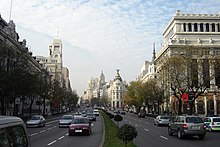Calle de Alcalá
 Calle de Alcalá with the Edificio Metrópolis, the Círculo de Bellas Artes and the La Unión y el Fénix Español building in the background | |
| Type | street |
|---|---|
| Length | 11 km (7 mi) |
| Location | Madrid, Spain |
| West end | Puerta del Sol |
| East end | Eisenhower Junction |
Calle de Alcalá is among the longest streets in Madrid. It starts at the Puerta del Sol and goes on for 11 km, to the northeastern outskirts of the city. Henry David Inglis described it in 1837 as "long, of superb width, and flanked by a splendid range of unequal buildings".[1]
History and landmarks[]

Calle de Alcalá is one of the oldest streets in the city. It was the old road which led to the city of Alcalá de Henares (from which it takes the name) and continued to Aragón; today, this route is covered by the A-2 motorway. Along this street it is possible to find landmarks such as Banco Bilbao Vizcaya at number 16, the former Alcalá 20 discothèque at number 20, Edificio Metrópolis, the Unión y el Fénix Español building at number 23, Círculo de Bellas Artes, Plaza de Cibeles, Puerta de Alcalá, the Spanish Ministry of Education, the Instituto Cervantes HQ building, the Bank of Spain building, Parque del Buen Retiro and Plaza de Toros de Las Ventas.
In popular culture[]
was a popular cuplé describing a florist selling tuberoses on the street.
Notable buildings[]
- Teatro Alcázar
- Teatro Apolo
- Banco Bilbao Vizcaya
- Banco de España
- Buen Retiro Park
- Casino de Madrid
- Círculo de Bellas Artes
- Convento de la Natividad y San José
- Edificio del Banco de España
- Edificio Metrópolis
- Iglesia de San José (Madrid)
- Iglesia de San Manuel y San Benito
- Instituto Cervantes
- Las Ventas
- Ministry of Education
- Palacio de Alcañices
- Palacio de Linares
- Plaza de Cibeles
- Plaza de la Independencia
- Puerta de Alcalá
- Real Academia de Bellas Artes de San Fernando
- Real Casa de la Aduana
References[]
External links[]
![]() Media related to Calle de Alcalá, Madrid at Wikimedia Commons
Media related to Calle de Alcalá, Madrid at Wikimedia Commons
- Calle de Alcalá
- Streets in Madrid
